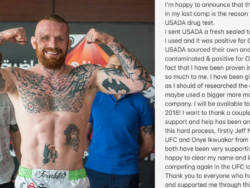The trouble with Ostarine: Jimmy Wallhead’s
16th March 2018
Features


In a two-hour hearing yesterday at the US Senate Committee on Commerce, Science & Transportation, US Soccer was attacked for not doing more to tackle corruption. Dan Flynn, CEO and Secretary General of US Soccer, said that US Soccer had no hard evidence of corruption, even after the Department of Justice (DoJ) published its 47-count indictment in May this year. It also said that US Soccer took the decision to remain part of FIFA’s organisation rather than opt out.
This is despite Flynn’s admission that US Soccer couldn’t make any positive reforms because it had little voting power in the 37-member north American and Caribbean soccer federation, CONCACAF, which was run by Jack Warner and Chuck Blazer. Blazer had already been arrested at the time of the DoJ indictment – which listed Warner as a defendant – and has already given evidence to US prosecutors. He was banned for life by FIFA earlier this month. Flynn said that he knew nothing about corruption within FIFA and CONCACAF, adding that Blazer hasn’t been involved with US Soccer since 1986.
This line was not accepted by Andrew Jennings (pictured), a UK investigative reporter who has written a number of books providing evidence to back allegations of corruption at FIFA dating back to the 1980s. Jennings said that the public knew about racketeering at CONCACAF since 2002, yet US Soccer had done nothing to tackle it. He described US Soccer’s failure to take on Warner as “cowardly”. Jennings alleged that US Soccer had information implicating Blazer, but ignored it, perhaps in order to improve the prospects of its failed bid to host the 2022 FIFA World Cup.
Senator Richard Blumenthal argued that US Soccer’s inaction in the past, present and future wrongdoing amounted to “complicity”. Flynn disputed this assertion, arguing that US Soccer is committed to reforming FIFA from within. Jennings said that US Soccer needed to hold an independent investigation into who at the organisation knew about the corruption allegations.
Conspicuous was the fact that US Soccer had decided to send Flynn, despite its President Sunil Gulati being called to give evidence. Both Blumenthal and Jennings questioned Flynn on this, who argued that US Soccer had elected to send him because he knows more about the day-to-day operations of US Soccer. FIFA turned down a request for its President, Joseph S. Blatter, to attend yesterday’s hearing, reports Reuters.
To watch the full two-hour hearing, click here. You can also view a video on Transparency International’s seven suggestions about how to reform FIFA by clicking here.
FIFA’s Executive Committee is meeting in Zurich next week (20 July), and one of the items on the Agenda, which has yet to be released, is a proposal from the Independent Ethics Committee, which FIFA funds, for greater transparency in Ethics Committee proceedings. “As it stands, the FIFA Code of Ethics prevents the names of accused parties within an investigation from being disclosed upon request.This is inconsistent with state criminal proceedings in Switzerland and Europe, which would provide significantly greater transparency”, said Cornel Borbély, the chairman of the FIFA Ethics Committee’s investigatory chamber in a statement. “Transparency should be accorded greater importance in the future when weighing up the protection of privacy against disclosure.”
FIFA President Joseph S. Blatter and General Secretary Jérôme Valcke will take part in a televised press conference after the Executive Committee meeting on 20 July at 14:00 CET. FIFA said that a video of the briefing would be available on its internet site for 90 minutes after the briefing.
England’s Football Association has dismissed England manager Sam Allardyce, after a Daily Telegraph investigation filmed...
• The South African Institute for Drug-Free Sport (SAIDS) has condemned Fancy Bears’ publication of a...
A further publication of data illegally obtained from the World Anti-Doping Agency’s (WADA) Anti-Doping Administration...